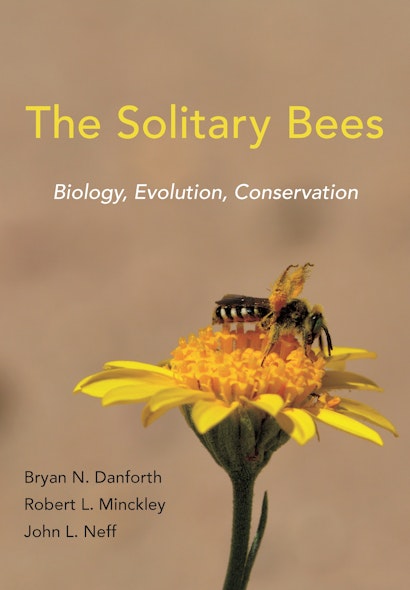While social bees such as honey bees and bumble bees are familiar to most people, they comprise less than 10 percent of all bee species in the world. The vast majority of bees lead solitary lives, surviving without the help of a hive and using their own resources to fend off danger and protect their offspring. This book draws on new research to provide a comprehensive and authoritative overview of solitary bee biology, offering an unparalleled look at these remarkable insects.
The Solitary Bees uses a modern phylogenetic framework to shed new light on the life histories and evolution of solitary bees. It explains the foraging behavior of solitary bees, their development, and competitive mating tactics. The book describes how they construct complex nests using an amazing variety of substrates and materials, and how solitary bees have co-opted beneficial mites, nematodes, and fungi to provide safe environments for their brood. It looks at how they have evolved intimate partnerships with flowering plants and examines their associations with predators, parasites, microbes, and other bees. This up-to-date synthesis of solitary bee biology is an essential resource for students and researchers, one that paves the way for future scholarship on the subject.
Beautifully illustrated throughout, The Solitary Bees also documents the critical role solitary bees play as crop pollinators, and raises awareness of the dire threats they face, from habitat loss and climate change to pesticides, pathogens, parasites, and invasive species.
Awards and Recognition
- Winner of the PROSE Award in Single Volume Reference/Biological Science, Association of American Publishers
"This is a brilliant, important and useful new text."—Bees for Development
"In the many vignettes and case studies throughout the text, the wonders of solitary bees are revealed. . . . I expect to return to this book to learn more about the truly incredible world of bees for a long time to come."—Stephen Fleming, Bee Craft
"This book . . . is an extremely thorough reference work that should amply imform the serious researcher about a specific topic being explored. However, it is also a highly entertaining and enlightening tome for the curious naturalist, allowing one to dip in and out at any point in the chapters lured by imaginative titling, and come away feeling enthralled and educated in the most beguiling manner."—Adrian Knowles, British Journal of Entomology and Natural History
"A wonderful book full of extraordinary information and research."—An Beachaire
"This book is a comprehensive most up-to-date resource on the biology and evolution of solitary bees. . . . People reading this book will likely further educate their friends, children or colleagues by sharing stories about the interesting natural history of solitary bees they learnt by reading across this book. By doing this, an increasing numberof people will ultimately contribute to protect nature and biodiversity."—Alexandra-Maria Klein, Basic and Applied Ecology
"For us, this book reinvigorated the pleasure of discovery, natural history and love for nature."—James D. Crall and Ignasi Bartomeus, Evolution
"There is something astonishing on every page."—Richard Jones, Discover Wildlife
"The Solitary Bees is an excellent book that gives an up-to-date overview of this amazing group of insects. It presents the newest knowledge on modern phylogeny and evolution, as well as on the biology and life cycle (including mating, nest architecture, foraging, and provisioning behavior) of solitary wild bees."—Conservation Biology
"The Solitary Bees provides a holistic overview of the astounding diversity of solitary bee species, integrating recent scientific advancements with fascinating stories of complex behaviors. This book will inspire a new generation of scientists to focus their passion on studying these species while helping all of us better appreciate the amazing bees in our backyards, farms, and parks."—Christina M. Grozinger, Pennsylvania State University
“This is a wonderful book—a much-needed addition to the literature on bees and pollinators.”—Laurence Packer, author of Keeping the Bees: Why All Bees Are at Risk and What We Can Do to Save Them
"The Solitary Bees is the essential guide to the biology, phylogeny, and behavior of these unsung heroes of the bee world. It skillfully blends the most up-to-date scientific knowledge with natural history studies to provide stunning insights into this fascinating group."—Simon Potts, University of Reading
“A significant contribution by respected leaders in this important field of research. This is the first book to synthesize what we know about the evolution, lifestyles, and associates of solitary bees.”—Robbin W. Thorp, coauthor of California Bees and Blooms: A Guide for Gardeners and Naturalists
"This inspiring and informative book is a sorely needed resource for all those who care about the conservation of pollinators. The Solitary Bees is a pleasure to read."—Mace Vaughan, Xerces Society for Invertebrate Conservation
"This richly detailed yet accessible book covers the ecology, evolution, and life history of solitary bees. A must-read for seasoned researchers as well as those who are new to the field."—Neal M. Williams, University of California, Davis
"Finally, we have the definitive book on most of the world's bee species—the solitary bees. Danforth, Minckley, and Neff have written a book that is extremely well-informed, full of charming natural history, and delightful to read."—Rachael Winfree, Rutgers University


